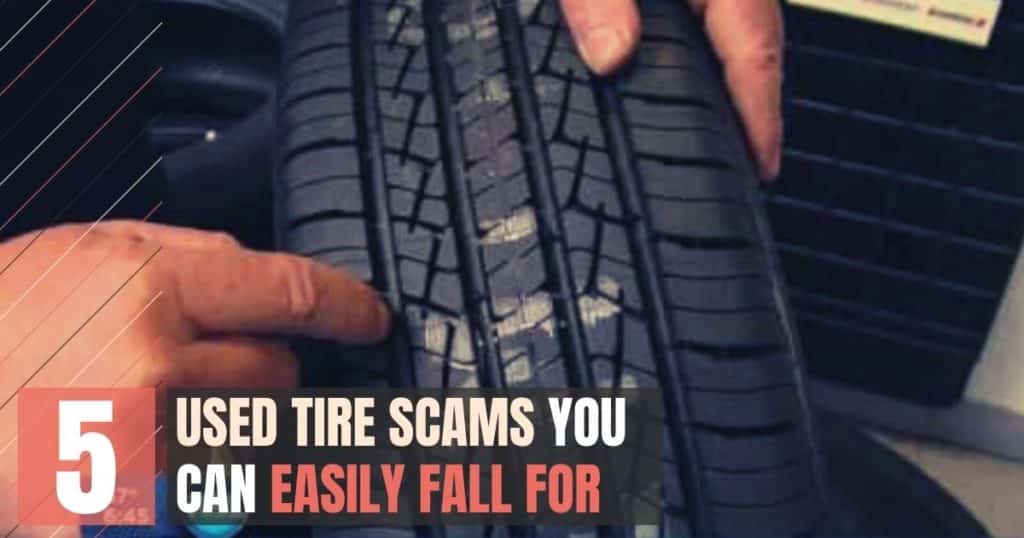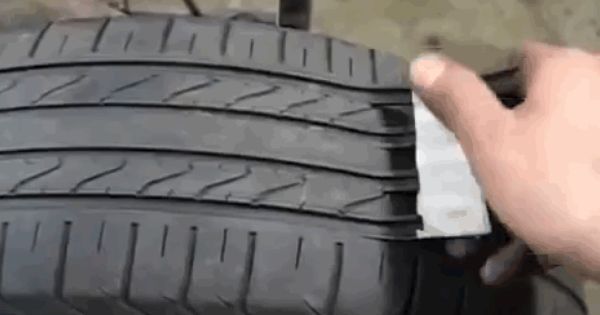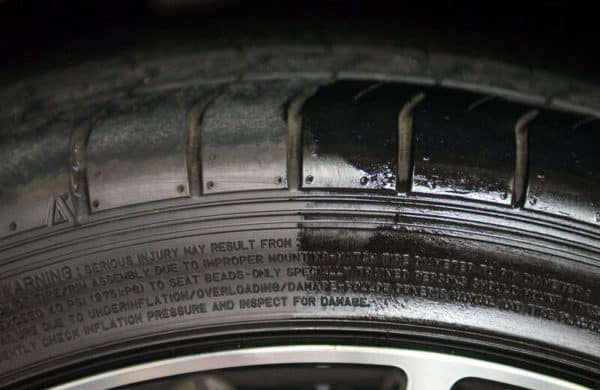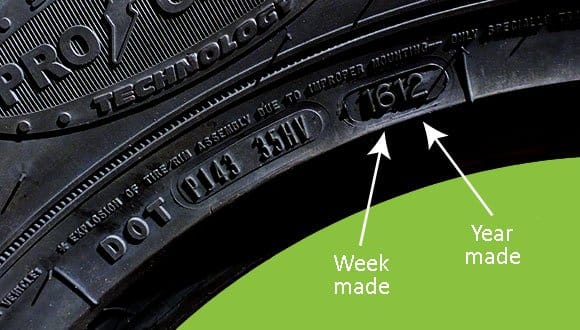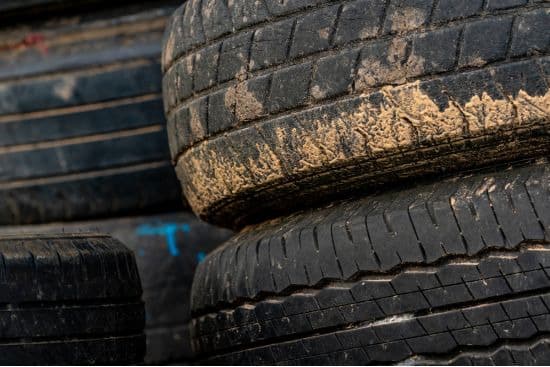The second hand tire industry is a booming U.S. market with high profits for wholesalers and retailers. Where there is money to be made, there is a scam around every corner and this includes used tire scams.
When digging deeper into accident statistics Safety Research & Strategies found that a significant number of accidents related to “aged” tires that were bought used. They were sold to motorists who thought they were getting tires because the condition visually looked good. In this article, I will share with you the most commonly used tire scams to avoid.
Used Tire Scams
It’s unbelievable how dangerous some of these are…
1. Regrooving Used Tires To Look Like New Tires
Tire scam artists will take a bald tire and “recondition” it to look like a brand new tire. This gives the illusion that the tire has tread depth and looks newer with dark black rubber grooves. What they do is cut new grooves into the tread and pull out the old rubber.
Then they do the same to the shoulder of the tire to fake the tread width. To a layman’s eye, these tires look like they have mileage left on them, when in fact they are death traps.
Never buy used tires from anyone you don’t trust and learn how to properly identify good condition used tires.
2. Painting Tires Black to Look Like New Tires
Some places will actually paint used tires black to give them the appearance that they are new. This makes them more attractive and visually appealing to consumers. By painting the tire it makes you think it is in better condition than it is, hides patches and punctures, and hides signs of aging rubber.
Even if they don’t paint the tires, they may apply tire shine or even Pledge for furniture to give the used tire a better appearance and shine.
3. Scratching of the DOT Code to Hide the Tires Age
Some scammers will scratch off the DOT number on a tire so that you can’t get the tire’s actual age. The DOT number is a marking on the tire that shows the week and year the tire was manufactured. According to the NHTSA, you should NEVER buy a tire more than six years old. Tired generally start to lose their flexibility after 3 to 5 years. A tire for 7 or more years is definitely degrading and on its way to being unsafe.
When you can’t tell the tire’s age, you can’t accurately assess what condition the rubber is in. If you see the DOT number scratched off, assume it’s old and move on.
4. Knock Off Brand Name Tires
Just like in any industry where there is high demand and high prices, there are knockoff versions of the products. The problem here is that spotting counterfeit tires is really hard, and has only recently been exposed due to consumer reports.
What’s even more frustrating is that customers who buy fake tires. Recently some fake Toyo tires were discovered. If you see a manufacturer code of “3E” and the last digits of “12” or more, they are counterfeit.
Knock-off tires will also often fail quickly when filled with air, be susceptible to cracking, blistering, and bulging, as well as wavy sidewalls and odd tread wear patterns. It may not even be the fault of the place you are buying from, they may have bought the tires from a scammer.
If you think you have bought fake tires contact the National Intellectual Property Rights Coordination Center and file a safety complaint with NHTSA through the safercar.gov website.
5. Disposing of Your Tires Before They Are Worn Out
This is the most common scam that happens every single day. When you take your car in for servicing or a basic tire repair they tell you that you need new tires when you don’t. You may in fact have more than 50% of your tread left.
Then they sell you new tires, charge you a disposal fee for the used tires, and then sell your used tires to someone else. They triple dip on you and you won’t know the wiser unless you know how your tires look and how to assess them. most of the time they tell you that you need new tires, your car is already up on a lift and they don’t take you back to see the tread wear.
The best question to is how much tread depth is left on my tire (new car tires start around 10/32 of an inch and trucks start between 12 -14/32 of an inch). If they tell you 2/32 of an inch, well that’s legally bald and you should replace it. Anything 5/32 and above is still safe for tread depth and you should ask them if anything else is wrong with the tire.
Identifying and Avoiding Tire Scams
Recognizing Red Flags: Too-Good-to-Be-True Deals and Lack of History
In the bustling market of tire sales, scam artists often find a lucrative opportunity to make a quick buck. Imagine walking into a tire dealer’s shop, and you find a deal that seems incredibly affordable. Your car needs new tires, and the offer seems too good to pass up.
But wait! Is it possible that those old tires with seemingly new grooves are actually worn-out tires being passed off as barely used? It’s essential to guess and scrutinize why the deal is so tempting. Worn tires can be dangerous, and it’s crucial to ensure you’re not being sold a potential road hazard.
Verifying Tire Health: Checking for Wear, Damage, and DOT Codes
When it comes to old rubber, appearances can be deceiving. Scam artists might present them as tires that have been barely used, but you might actually be paying dollars for something that should be recycled instead of being on your car.
Always check for wear and any visible damage. Look at the DOT codes to verify the age of the tires. If a shop is selling tires that are visibly worn or damaged, it’s a clear sign to steer clear.
Legal Recourses: Actions to Take if Scammed
Nobody wants to be taken advantage of, especially when it comes to safety. If you find that you’ve been sold worn-out tires under the guise of them being safe to use, it’s essential to take legal action.
Report the shop or individual selling the tires to your local authorities and consumer protection agencies. Keeping scam artists accountable not only protects you but also prevents them from taking advantage of others in the future.
Buying Safe Used Tires: Tips and Precautions
Purchasing used tires doesn’t always have to be a risky endeavor. There are legitimate shops and dealers who sell used tires that are safe to be on the road. Always pay attention to the tire’s history and ask for any documentation that verifies its condition and age.
Don’t be swayed by guys who promise excellent quality for an unbelievably low price, especially if they pressure you to make a quick decision. Remember, if a deal seems too good to be true, it probably is.
In conclusion, while shops and dealers selling used tires can offer valuable deals, it’s vital to approach such transactions with caution and thorough scrutiny to ensure that the dollars paid are worth the product received. Always prioritize safety and legality to ensure that your week on the road is smooth and secure.
Used Tire Scams – Conclusion
The prospect of buying used tires is already a dangerous business because a tire without a group is a death trap. With scammers out there who don’t care about what they sell you, it makes the second hand tire market even more dangerous. Some of these tires in end up going for free in some pile, where you can easily be lured into the trap.
When I buy used tires near me, I only deal with places and people I can trust. Watch for the used tire scams above and save yourself money and maybe even your own life. If you are a used tire buyer, it’s helpful to understand some tire basics. So many people opt for cheap used tires when you should only opt for safe used tires.
FAQs (People Also Ask)
Is it safe to buy used tires?
Buying used tires can be a cost-effective solution, but it comes with certain risks. Worn tires may have experienced various stressors like overloading or high-speed driving, which can lead to internal damages not visible externally. Thus, ensuring safety can be challenging.
How to verify the safety of used tires?
To verify the safety, inspect the tires for any visible damages, or irregular wear patterns, and ensure they are not old tires. Check the DOT code to confirm their age and inspect for any recalls or known issues.
What are the legalities involved in selling used tires?
Legalities can vary by region. A tire dealer must ensure that the used tires sold are in a safe, usable condition and adhere to the local laws and guidelines regarding the sale of used automotive parts.
How to report a tire scam?
If you suspect a tire scam involving the sale of unsafe or worn tires for cars. It’s crucial to report it to local authorities. Additionally, submitting a complaint to consumer protection websites and alerting local communities online can help prevent others from falling victim to similar scams.
